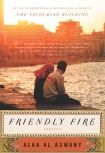Friendly Fire by Alaa Aswany (best e book reader TXT) 📗

- Author: Alaa Aswany
Book online «Friendly Fire by Alaa Aswany (best e book reader TXT) 📗». Author Alaa Aswany
And that would be it—a question, and the matter left to me. If I ignored the question, things ended there. If, however, I hesitated and seemed to be thinking it over, he’d be encouraged and would rush to talk to me enthusiastically about the importance for regular study. Then he’d say, in an uncertain voice, “I don’t know, you know. I don’t think there’s any call for this playing hooky thing. What do you think?”
My father was weak and as a result his life ended in total defeat. But despite his failure and his weakness, I liked him. I liked him because he accepted his defeat with the silence of one who knows the rules. He didn’t fill the world with lament and he didn’t turn into a poisonous insect. On the occasion of a major competition, my father would await the result among the other competitors, and, when he found out that he’d lost and someone else had won, he wouldn’t express astonishment or anger but carefully gather his things together, smiling sadly, and then make haste to catch the last bus and, if he felt comfortable with the passenger sitting next to him, would tell him everything that had happened, in a neutral tone of voice. His neighbor would listen to him, at first with pity, but then some small thing—such as my father’s shoes or his shirt or even an expression that passed over his face—would cause him to understand why he had failed and the man would feel less, or even not at all, sorry.
Lots of people spent their evenings at our house. There were many names belonging to people of differing professions and ages. As some disappeared through travel, or death, new faces appeared. Despite their differences, they were joined by a common thread: all were major unfinished works. El-Ghamdi was a teacher of Arabic language who had once hoped to be a poet. Muhammad Irfan was a former Marxist who had abandoned his dream of changing the world and made do with arts journalism; he made up news items about dancers and singers and blackmailed them. Even ‘Uncle’ Anwar I discovered from my father, had dreamed of being a great songwriter and had ended up playing backing zither to the dancer called Sugar. And there were many others. A band of people with shattered dreams, like old people carping at a wedding, who met every evening to curse blind luck and the lousy times: “We knew So-and-so when he used to pray God for the price of a cigarette, and now he’s got more money than he knows what to do with, with a villa in el-Maadi, a chalet in el-Agami, and three luxury cars. And So-and-so, the famous singer—didn’t he fail the radio test in the fifties? You can believe that story because I was a member of the committee!” When I sat with my father’s friends, I never felt for an instant that they loved one another. They feuded all the time and violent quarrels were always breaking out among them. Nevertheless, they took care to come and never broke with one another because what joined them was stronger than their enmity. They needed these gatherings, because at them their sense of inadequacy was dissolved in their awareness of their common fate, and when they met none of them was embarrassed by his failure.
I would use any excuse to escape from sitting with them and only stay up late with them if Uncle Anwar was present. Uncle Anwar was different. He was my father’s closest friend, the two of them joined by thirty years of friendship. Once they had lived together in a single room on Bein el-Sarayat, my father dreaming of painting, Anwar of music. Anwar earned a lot from his work with Sugar and spent lavishly on himself and his friends. He had never married because marriage, in his opinion, gave you the blues and the blues shortened your life. Uncle Anwar was nice. He never stopped making fun of things and stirring those around him to laughter. On what he called ‘nights of joy,’ which were those following the wedding of some rich person, Uncle Anwar would appear in the circle bearing ‘goodies’—a big bottle of brandy, an ounce of good-quality hashish, and a kilo of kebab and sweetbreads, and when his friends received him with cheers, Uncle Anwar would affect a grave face,





Comments (0)